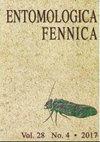Cereal pests among nest parasites – the story of barley thrips, Limothrips denticornis Haliday (Thysanoptera: Thripidae)
Q3 Agricultural and Biological Sciences
引用次数: 5
Abstract
Barley thrips, Limothrips denticornis, Haliday, 1836 (Thysanoptera: Thripidae), a grass-dwelling Holarctic species represents a model example to study transport mechanisms of Thysanoptera into nests. In samples from more than 1,500 nests, barley thrips were recorded in nests of 20 vertebrate species, both birds and mammals. Applying appropriate statistics (nonparametric methods) clear clustering among nest materials and a strong relationship between presence of thrips and grass as the nest material was found. Occurrence of thrips was not associated with nest size, location or height. To validate our statistical analyses 15 wooden boxes were installed and equipped with sticky traps to record the whole year migration dynamics. Barley thrips infiltrate nests by various ways (e. g. dwelling on bark, landing from atmosphere), however most of them (88%) invade passively on nest material (grass) in spring (1st summer nesting) and autumn (winter nest building).燕窝寄生虫中的谷物害虫——大麦蓟马、利莫什里普斯(Thysanoptera:Thripdae)的故事
大麦蓟马,Limothrips denticornis,Haliday,1836(Thysanoptera:Thripidae),一种草栖全北极物种,代表了研究Thysanooptra进入巢穴运输机制的一个典型例子。在1500多个巢穴的样本中,在20种脊椎动物(包括鸟类和哺乳动物)的巢穴中记录到大麦蓟马。应用适当的统计学(非参数方法),在巢材料之间发现了清晰的聚类,并且在作为巢材料的蓟马和草之间存在着强烈的关系。蓟马的发生与巢的大小、位置或高度无关。为了验证我们的统计分析,安装了15个木箱,并配备了粘性陷阱,以记录全年的迁徙动态。大麦蓟马通过多种方式侵入巢穴(如栖息在树皮上、从大气中降落),但大多数(88%)在春季(夏初筑巢)和秋季(冬季筑巢)被动侵入巢穴材料(草)。
本文章由计算机程序翻译,如有差异,请以英文原文为准。
求助全文
约1分钟内获得全文
求助全文
来源期刊

Entomologica Fennica
生物-昆虫学
CiteScore
1.20
自引率
0.00%
发文量
0
审稿时长
>12 weeks
期刊介绍:
Cessation.Information not localized
 求助内容:
求助内容: 应助结果提醒方式:
应助结果提醒方式:


